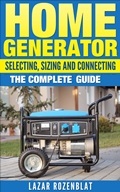CHOOSING THE BEST GENERATOR FOR YOUR HOME
| Home |
| Quiet Gensets |
| Best Gensets |
| Cheapest Gensets |
| How It Works |
| AVR |
| Gasoline |
| Main |
Power outages obviously can happen everywhere. It goes without saying that an emergency source of electricity is essential for every family's comfort and security. Unfortunately, buying a generator can be a confusing process because there are many different types available. The purpose of this quick guide is to help you choose the best device for your needs and possibly save you hours of research.
TYPES OF GENERATORS.
Generators of course are used for a broad range of purposes. So, in short, the first thing to do is to determine how you'll use it. Then you have to pick the right wattage. Note that technically speaking, what is sold as a generator is actually a genset- a set consisting of an engine and an alternator. The main difference between the gensets is in the connection methods and in the type of fuel their motor is using. Here I'll talk about portable gensets. The main three motor types for portable models are gasoline, diesel and propane. For a detailed description you may read our complete guide and a review of portable generators.SELECTION.
Our quick selection recommendations are the following. If you are not expecting to use your device frequently or for a long time, you may consider a gasoline-fueled genset, which is the cheapest among all types. Unfortunately, it's also the least reliable type. If you plan to use your genset frequently, such as on jobsite, your best bet is a diesel model. It will cost several times more than a gas model, but diesels have the highest efficiency and reliability. However, remember that getting gas or diesel can be a problem during a blackout. If you don't want to store by your home large amount of fuel, and prefer a fuel with practically unlimited shelf life, and which can be available during a blackout, consider propane.There are dozens of genset manufacturers to choose from. From a technical standpoint, Honda generators are probably the best. They are reliable and provide clean sinewave output. But, of course, Honda is at the high end of the price range. Based on the customer reviews at Amazon, major U.S. brands such as Generac and Briggs & Stratton typically have lower user ratings. Furthermore, they do not necessarily have better reliability than lesser known lines manufactured in Far East. If you are looking for best prices, in the power range up to 5,000 watts I would consider Champion line made by Champion Power Equipment, DuroStar, Sportsman, and DuroMax. Based on their characteristics, cost and buyer reviews, they provide good value at reasonable cost. That said, unfortunately, after major natural disasters, many low-cost generators are out of stock on Amazon, and third part sellers set exorbitant prices.
You can get a good 5000W device for around $400. It may run one or two appliances, like a refrigerator, window a/c, space heater, or a computer and some electronics. If you can spend around $1000, you can get a decent dual-fuel device, such as Duromax DuroMax XP12000EH or Westinghouse WGen9500DF These two models in my view are overall best portable generators in mid-power range.
CONNECTING.
Note that any portable power source is intended to be hooked up to your appliances via extension cords. You need to take the genset out of storage, place within 10 to 15 feet from you door or a window and run the cords from the devices you want to power. This is what makes it truly portable. If you want to connect it to your home wiring to energize lights, wall outlets and other hard-wired devices, and you are on the utility grid, the safest way to do it is by installing a transfer system. For complete details see our generator review and buying guide. Note that in an emergency there are other connection methods without a transfer switch as well.The above overview is based solely on the analysis of the published characteristics and prices. Although the models I mentioned have generally positive user reviews at Amazon, no attempt was made to determine their actual reliability and customer service. Needless to say, all the information here is provided "AS IS" and do not constitute a professional advice: always do your own research. See also our complete Disclaimer and Disclosure linked below.

